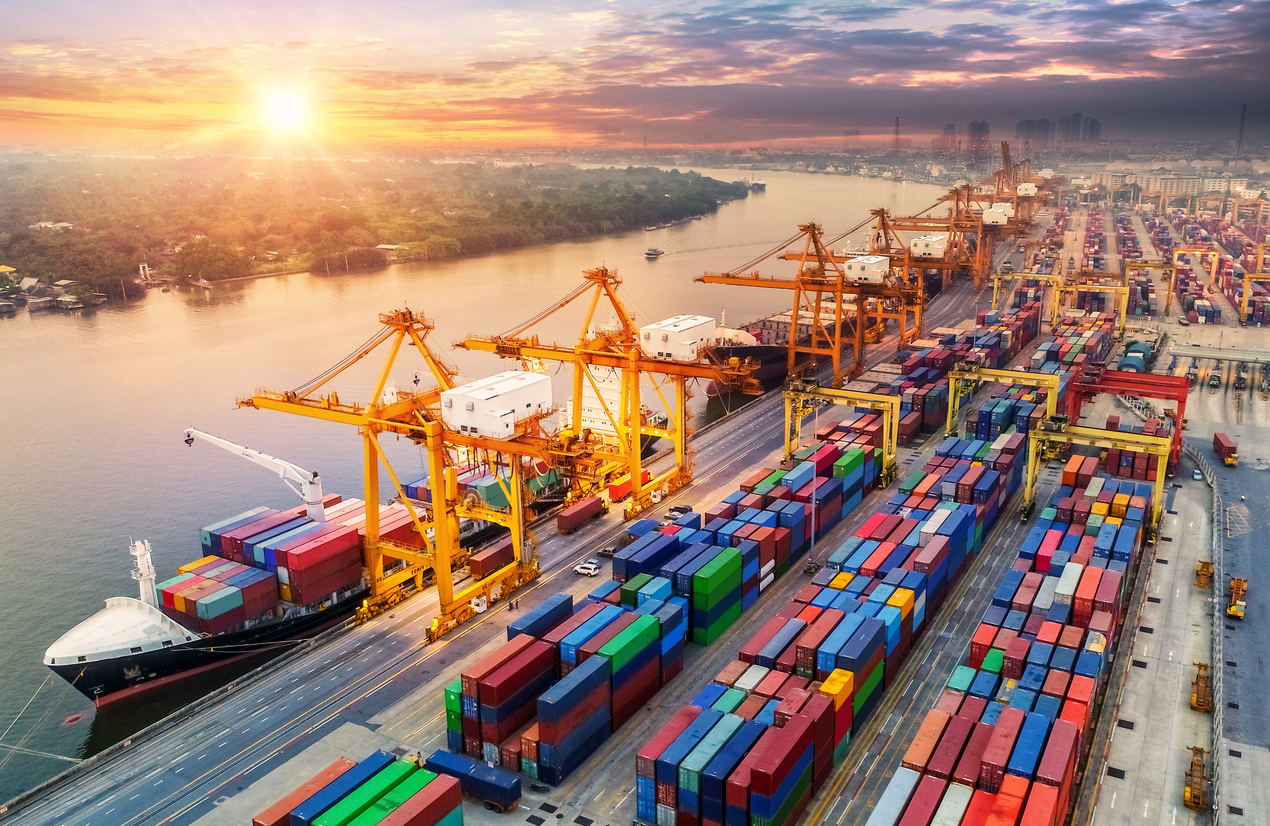Bottlenecks and the Bottom Line

Baylor’s Global Trade and Supply Chain Management concentration prepares online MBA students to lead in a time of crisis.
Before the COVID-19 pandemic, few Americans devoted much thought to global trade and supply chains. With the advent of empty shelves, higher prices and longer wait times, these concepts have gradually become part of our everyday conversations.
 Daniel Ogden That is a good thing, according to Daniel Ogden, a lecturer who teaches Global Trade Compliance Strategies, a core course in Baylor’s Global Trade and Supply Chain concentration at the Hankamer School of Business. “One of the silver linings of the pandemic is the heightened awareness about global supply chains,” he said. “People are starting to realize that products don’t appear out of thin air.”
Daniel Ogden That is a good thing, according to Daniel Ogden, a lecturer who teaches Global Trade Compliance Strategies, a core course in Baylor’s Global Trade and Supply Chain concentration at the Hankamer School of Business. “One of the silver linings of the pandemic is the heightened awareness about global supply chains,” he said. “People are starting to realize that products don’t appear out of thin air.”
Online MBA students enrolled in Dan’s course are tasked with submitting a news article related to the topic of each course module. These days, the challenge is not to find something relevant, but to choose among the myriad of headlines signaling supply chain woes. From healthcare providers and auto manufacturers to airlines and grocery retailers, no one has emerged from the pandemic unscathed.
One of the most widely publicized supply chain failures, the underproduction of semiconductor chips, is even worse than people think, said Dan. One of the two largest producers of semiconductor chips is based in Taiwan, which is constantly vulnerable to Chinese aggression. “All it would take would be for China to take military action against Taiwan to further disrupt the whole chip supply chain and send prices skyrocketing,” he said.
 Van Gray Whether it is powders imported to manufacture pharmaceuticals or raw materials to meet the accelerating housing demand, stories of risk and disruption abound. “We are witnessing massive failures of every supply chain across the globe,” said Van Gray, a professor of management who teaches Manufacturing and Service Operations, another core course in the Global Trade and Supply Chain concentration. “It is important to recognize that many of these failures were exacerbated, but not created, by the pandemic.”
Van Gray Whether it is powders imported to manufacture pharmaceuticals or raw materials to meet the accelerating housing demand, stories of risk and disruption abound. “We are witnessing massive failures of every supply chain across the globe,” said Van Gray, a professor of management who teaches Manufacturing and Service Operations, another core course in the Global Trade and Supply Chain concentration. “It is important to recognize that many of these failures were exacerbated, but not created, by the pandemic.”
In the interest of efficiency and cost reduction, businesses have been trending toward a production model that is far too lean. In many cases, “just-in-time" models have turned out to pose an unacceptable level of risk. “We have to get to the point where we are managing our supply chains so that they are operating ahead of time, not just in time or behind schedule,” said Van.
The pandemic has incentivized businesses across industries to alter their supply chain models and invest in additional capacity, but the next crisis is always waiting around the corner. There has never been a greater need for skilled leaders to navigate ongoing bottlenecks and shortages. The Global Trade and Supply Chain concentration is specifically designed to address that need by preparing leaders to maintain sustainable, agile supply chain ecosystems. “The thing that distinguishes our program most from others is the strategic focus,” said Dan. “Whereas business in general tends to be quite reactive, we are emphasizing a proactive approach to strategy.”
In each course within the concentration, online MBA students study cases that illustrate classic themes in global trade and supply chain management, including constraint identification, bottleneck monitoring, capacity planning and scheduling, decision-making frameworks and risk evaluation. In Manufacturing and Service Operations, for example, their first case involves creating a plan for a global agribusiness interested in expanding from fertilization production to food processing. “Cases like this highlight common tensions and questions that students will encounter in their professional careers regardless of their position,” said Van.
Along with marketing and risk management, operations forms the third leg of the stool for every business, Van and Dan pointed out. Many students who complete the Global Trade and Supply Chain Management concentration will land roles in logistics, plant operations, supply chain strategy, purchasing and other similar functions, but the knowledge gained in the concentration is broadly applicable.
“Whether or not they work in areas like trade compliance, students will eventually interact with people who do,” said Dan. He gives the example of an online MBA student who moves into a finance role. If a colleague in supply chain management requests budget approval for opening a manufacturing facility overseas, the finance professional will need a solid grasp of global trade compliance—and how it relates to global supply chain strategy and management— in order to make an informed decision.
For Van, Dan and their colleagues, watching their students connect the dots between theory and practice provides tremendous satisfaction. “The best part of the job is having students tell me that they are learning things today they will use tomorrow in the office,” said Dan. “Through these global trade and supply chain classes, our MBA students are providing immediate value to their companies.”
There are no perfect solutions to the problems that supply chain professionals are facing, acknowledged Van. “But effective leaders are resilient enough to develop effective plans of action,” he said. “That is the kind of leader we are building here at Baylor.”
Van Gray, PhD, is a Professor of Management and Director of Strategic Planning and at Baylor University’s Hankamer School of Business. He is an active consultant in the field of manufacturing planning and control and has advised numerous Fortune 100 and 500 firms.
Daniel Ogden, JD, is a Lecturer in International Business at Baylor University’s Hankamer School of Business. He is an attorney at law, a licensed customs broker, and an international trade consultant who for more than 30 years has counseled and represented U.S. and foreign companies on international trade and business legal and regulatory issues.
What's Next
Do you aspire to become a leader in a challenging, in-demand field? Consider an online MBA with a concentration in Global Trade and Supply Chain Management.
To speak to one of our admissions advisers, fill out the form below.